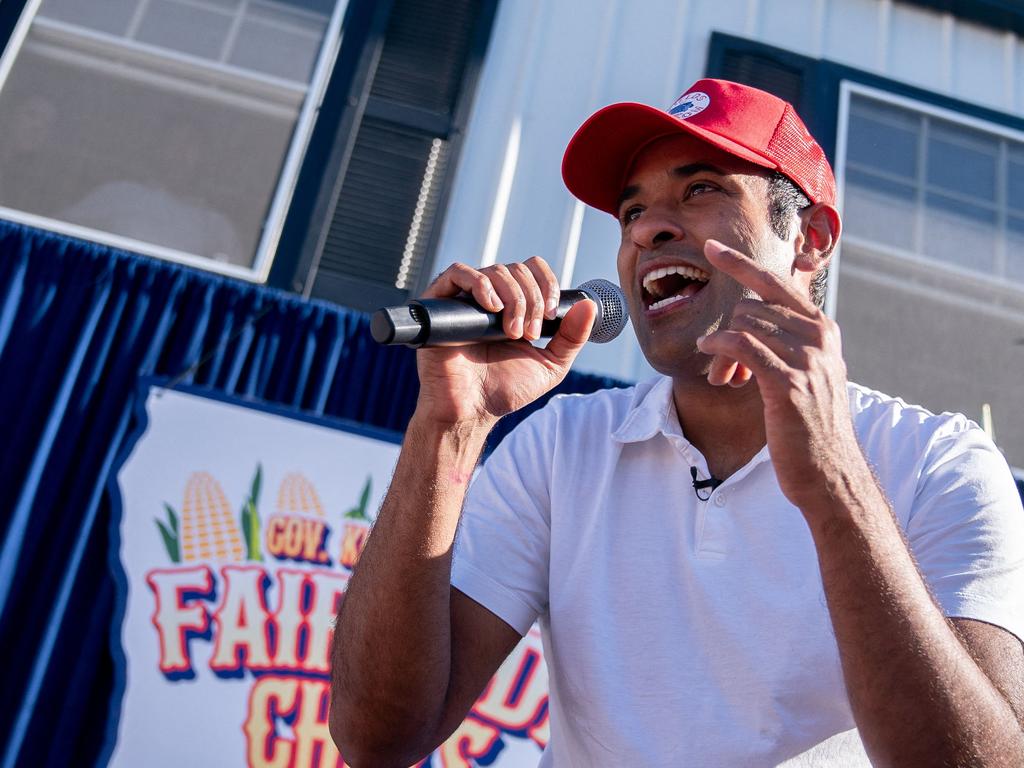The Brash Strategy That Made Vivek Ramaswamy a Fortune
The swagger and contrarianism that 38-year-old Vivek Ramaswamy displayed at the first Republican presidential primary debate – trading barbs with Mike Pence and Nikki Haley — are the same qualities that propelled his 16-year business career.
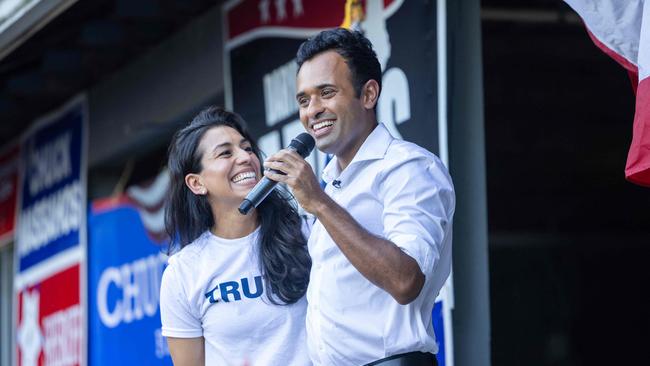
Vivek Ramaswamy was a novice biotech entrepreneur in 2016 with no advanced medical training and no record of developing drugs.
Yet his company landed a meeting with Eli Lilly officials, including its future CEO, on the sidelines of a medical conference in Toronto. Scribbling scientific diagrams on a board, Ramaswamy discussed the possibility of one of the world’s biggest drugmakers acquiring the company’s experimental Alzheimer’s drug. Never mind that its previous owner shelved it after it failed four studies.
The swagger and contrarianism that Ramaswamy, 38 years old, displayed at the first Republican presidential primary debate last month – trading barbs with former Vice President Mike Pence and former United Nations Ambassador Nikki Haley, and disavowing one of Ronald Reagan’s signature lines – are the same qualities that propelled his 16-year business career.
He made a fortune as a hedge-fund investor buying undervalued pharmaceutical stocks that later skyrocketed. He founded a biotech start-up now worth $US9 billion, called Roivant Sciences, to advance drugs that big drugmakers deprioritized. And he started and backed financial firms to appeal to an audience that he thought Wall Street ignored.
“The guy you see on TV is the guy. He hasn’t changed,” said Bill Symonds, a former Roivant executive. “He’s not afraid to ask questions, he’s not afraid to push back if he doesn’t agree with something. And that’s the same way he was as a CEO.”
This account of Ramaswamy’s business career is based on interviews with more than 20 employees, investors, advisers and others who know or worked with him, as well as a review of securities filings, financial disclosures and court documents.
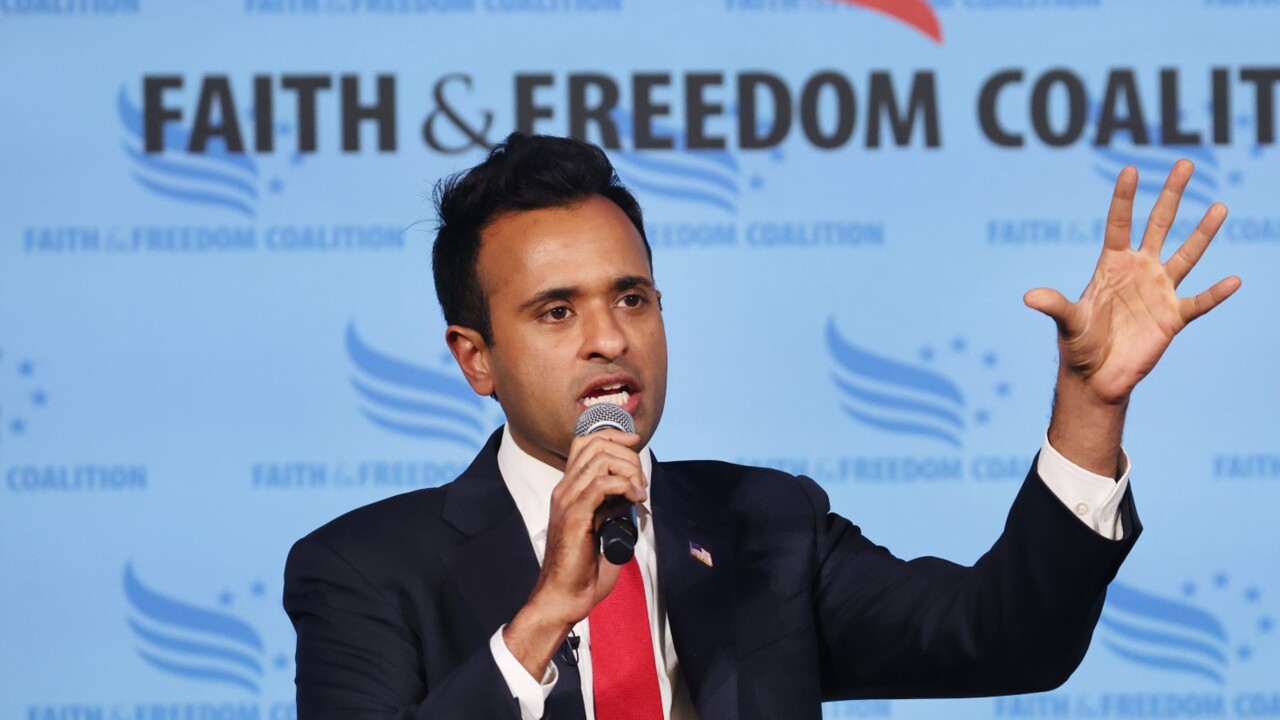
“The way I achieved success, follow a simple formula: Find where the pack is going and then figure out what they missed,” Ramaswamy said at a campaign event earlier this year. “In order to be successful, I think you have to buck the consensus, and you have to be right.”
That philosophy helped five drugs his companies developed later win approval, including treatments in women’s health and for a rare condition in children.
But many times in his career, Ramaswamy bucked the consensus and was wrong. Of about two dozen biotech start-ups in Ramaswamy’s former empire, at least six folded and at least 16 drugs failed studies or were discontinued. Among those was Axovant Sciences and intepirdine, the compound Lilly had discussed acquiring and that failed its pivotal trial in 2017.
The Ramaswamy campaign said Roivant’s success rate vastly exceeded industry averages, driven by its willingness to kill failing projects early on, which reduces the cost of drug development. Less than 5% of biotechs formed in the past decade worked on a medicine that won regulatory approval, it said.
Ramaswamy was a large investor in a banking start-up that flopped acrimoniously.
His bravado has also outpaced his record at times. Last year, he co-founded an asset manager that opposed environmental, social and corporate-governance investing principles called Strive. “I took on the ESG industrial complex, and I won,” Ramaswamy said in a July online video.
Strive manages $1 billion in assets, which wouldn’t rank it among the top 50 in its field. Net assets in Strive’s largest fund peaked early this year. A former Strive employee accused Ramaswamy in a lawsuit of pressuring her to violate securities laws.
“This is a frivolous lawsuit from an aggrieved underperformer who was fired and is now being an opportunist,” Tricia McLaughlin, a campaign spokeswoman, said in a statement. A Strive spokeswoman said the company intends to vigorously defend itself in the lawsuit. Disagreement with the ESG movement animated Ramaswamy’s interest in politics starting in 2020, but his policy views have gone far beyond that. He has staked out a policy platform he calls “America First 2.0,” echoing a slogan of former President Donald Trump, that is heavy on nationalist positions that appeal to the party’s far right.
Republican primary voters believe Ramaswamy and Haley exceeded expectations the most in the Aug. 23 debate that featured eight people challenging Trump for the GOP nomination, according to a Wall Street Journal national poll taken afterward. Those positive impressions so far haven’t turned into significant ballot support, with Haley the first choice of 8% and Ramaswamy at 5%.
The poll showed 55% of GOP primary voters have a favorable view of Ramaswamy, while 26% hold an unfavorable opinion of him.
A super PAC backing Florida Gov. Ron DeSantis prepped him to attack Ramaswamy during the debate for doing business in China, although they didn’t engage on the topic. Roivant helped launch the now-closed Sinovant Sciences in Shanghai in 2018, the same year Ramaswamy spoke at a pharmaceutical conference there.
Asked recently on Fox News whether he would share a transcript of his remarks at the conference, Ramaswamy said, “Absolutely. In fact, there’s nothing to hide.” The Journal asked his campaign on Aug. 25 for a transcript or video of his speech.
“We have searched and do not have it, but we are totally fine if Roivant or anyone else shares it,” McLaughlin said in a statement. “Mr. Ramaswamy has spoken and written extensively about how his views on the threats posed by China changed over the years.”
Ramaswamy’s personal financial disclosure lists investments with firms that invest in Chinese tech companies and cannabis businesses, potentially a turnoff for Republican voters. The campaign said his investment portfolio is managed by a third party without his input.
The candidate, who owns roughly $US690 million in stock and millions more in options in the company he founded, is mostly self-funding his campaign. Forbes has estimated his net worth at just less than $1 billion.
Ramaswamy doesn’t have the resume of the “outsider” he sells himself as on the campaign trail. He has degrees from Harvard University and Yale Law School, interned at Goldman Sachs and spent seven years on Wall Street picking stocks at a hedge fund called QVT Financial.
Behind many of Ramaswamy’s biggest wins at QVT was a view that the market was underestimating the promise of hepatitis C therapeutics. QVT bought shares in Pharmasset and other small drug developers focused on treating the liver disease. QVT was one of Pharmasset’s largest shareholders in 2011 when Gilead Sciences offered to buy the company for nearly $11 billion, about a 90% premium to its market value at the time.
Ramaswamy left QVT to start Roivant in 2014. Armed with a handwritten list he’d made of experimental drugs shelved or no longer prioritised by big companies, the idea was to identify ones that could be advanced and to do so quickly.
To be more nimble and efficient than big companies, Roivant launched subsidiaries — which it called “Vants” — specialising in disease areas such as women’s health or urology to acquire the compounds, finish their clinical testing and steer them through regulatory approval.
“He always had — not crazy ideas — but he always thought about things a little bit more out of the box,” said Brent Saunders, chief executive of eye-care company Bausch + Lomb who met Ramaswamy about a decade ago.
In Roivant’s early days, Ramaswamy hosted salon-like dinners in private rooms of Manhattan restaurants with investors and industry officials to chat — and debate — wonky healthcare issues like drug pricing.
People who worked for Ramaswamy’s biotech companies described him as a smart, charismatic and visionary leader. Many also said he was a demanding and workaholic boss, with offices that felt like a manic trading floor and where CNBC often played on televisions.
Ramaswamy hired college and law-school classmates and Wall Street pros with little experience in pharmaceuticals to work alongside industry veterans. The start-up environment felt chaotic and intense to former employees, with Ramaswamy expecting his staff to respond to emails and phone calls immediately and be prepared to debate the merits of their decisions constantly.
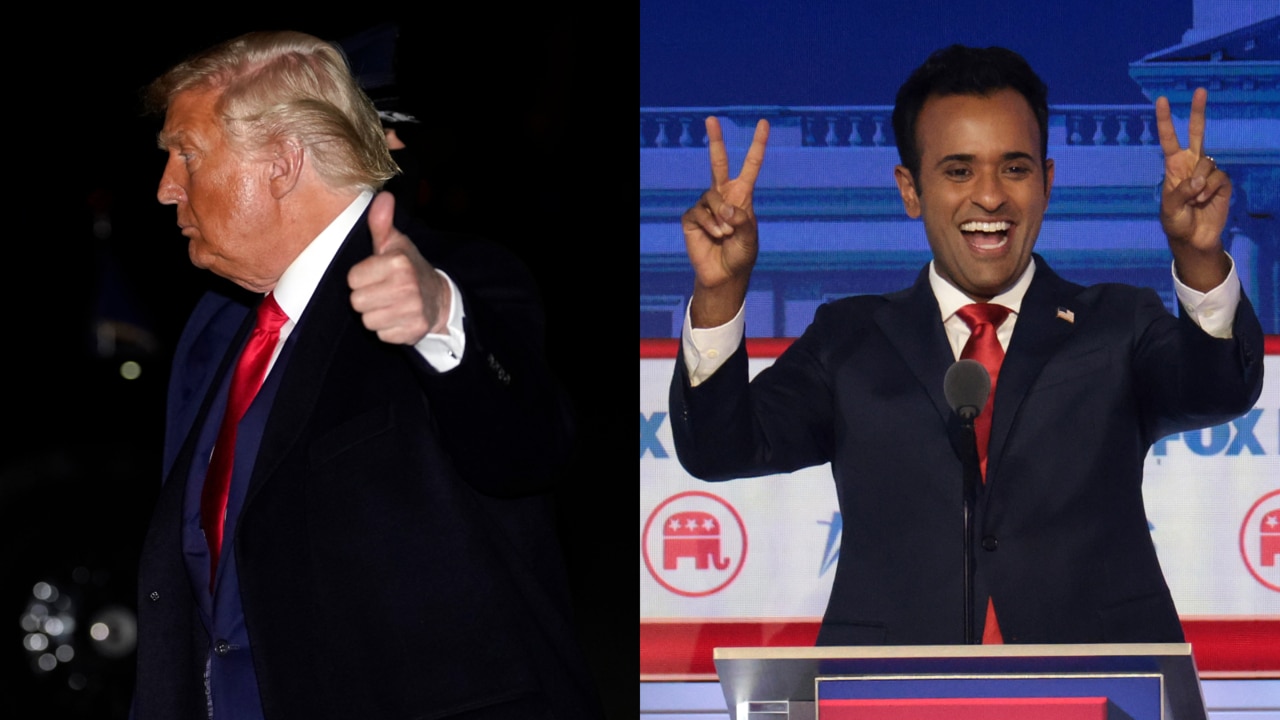
Financial engineering was crucial to Roivant’s model. Employees were given upside in Vants that would pay off if the medicines and therapies they worked on took off. Ramaswamy and Roivant launched initial public offerings for some Vants, merged another into a blank-check company well before that craze swept Wall Street, and did a complex $3 billion deal with Japanese pharmaceutical company Sumitomo Pharma that included the sale of stakes in five Vants.
“He was a brilliant financial engineer, but he didn’t seem to have the same passion for science, medicine and patients that you see with most biotech CEOs,” said John Maraganore, former CEO of biotech company Alnylam Pharmaceuticals who got to know Ramaswamy at industry events.
McLaughlin disputed that notion, saying Ramaswamy’s “understanding of basic science and drug development exceeded that of many industry veterans.”
Ramaswamy was a largely apolitical CEO. At a party with employees after the 2016 election – an election in which he didn’t vote – Ramaswamy as a joke handed out to employees “Make America Great Again” hats and phony certificates naming some of them to cabinet positions.
That playfulness has been mostly absent from Ramaswamy’s campaign, which has featured an ominous tone similar to Trump’s. At the debate, he suggested Ronald Reagan’s famous “Morning in America” ad no longer has validity. “It’s not morning in America,” he said. “We live in a dark moment.”
Five drugs Roivant licensed from other entities later won US approval, though four of the medicines were cleared after Roivant sold its stakes. The four drugs are now sold by Sumitomo Pharma.
All the drugs had gone through some human testing by the time Roivant or its subsidiaries took over development, including its psoriasis treatment Vtama that was approved last year.
But there were misfires. Last year Roivant shut down six programs, including drugs for sickle cell disease and acne. Some critics say Roivant’s drug-development record isn’t stronger than other companies’, despite its financial success. They say it should be better because it acquires drugs that have already undergone some testing, unlike drugmakers evaluating their own discoveries.
None of Roivant’s subsidiaries “ever became great companies, and I would project that none of them will ever be great companies because they’re not about company building,” Maraganore said. “It’s about financial return.”
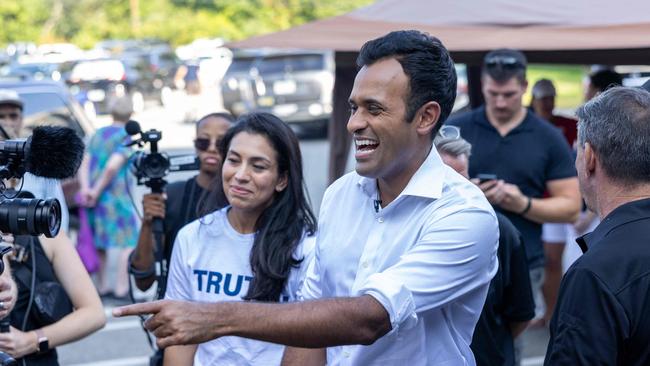
Roivant didn’t comment on the relative strength of their record developing drugs.
After Ramaswamy called the Food and Drug Administration corrupt in July, Roivant CEO Matt Gline said at a Twitter Spaces event that he disagrees with most of his former boss’s platform. “We have been happy with our ability to separate ourselves from him and focus on what we care about, which is advancing these programs that matter,” Gline said.
Ramaswamy’s public shift toward politics began in 2020 when he started writing Journal opinion columns that promoted his views opposing ESG principles and big-tech companies’ censorship policies. He stepped down as Roivant’s CEO in January 2021 and published his first book, “Woke, Inc.,” later that year.
Around this time, he was introduced to GloriFi, an anti-woke banking start-up backed by Nick Ayers, a former chief of staff to Pence, and Toby Neugebauer, a former private-equity investor and financial backer of Republican Senator Ted Cruz of Texas.
GloriFi planned to provide checking accounts and other financial services to conservative Americans who felt big banks were too liberal. On GloriFi’s road map were a credit card made out of the same material used for shell casings and a homeowners insurance policy that gave discounts to gun owners.
Ramaswamy was the second-largest investor in GloriFi, according to a court filing. He provided advice to Neugebauer, GloriFi’s CEO, and recommended someone for a top job, according to emails and text messages reviewed by the Journal. Other GloriFi investors courted Ramaswamy to succeed Neugebauer as CEO, people familiar with the company said. McLaughlin said that Ramaswamy was an investor in an entity that represented the second-largest investor in GloriFi and he never had interest in the CEO job.
But GloriFi stumbled getting out of the gate. Some employees alleged that Mr. Neugebauer had a volatile temper and drank on the job, and the company’s unusual workspace — Mr. Neugebauer’s home in Dallas modelled after the White House — added distractions.
After Ramaswamy weighed in on a March 2022 proposal to raise capital, Neugebauer told a GloriFi board member that Ramaswamy wanted to steal GloriFi, according to an arbitration claim Ayers later filed against Neugebauer. Neugebauer then told the board member that he would “get his gun, get on his plane, fly to Ohio, and kill Ramaswamy,” according to the arbitration claim.
The campaign said Ramaswamy only offered advice “like other passive investors in the company.”
Neugebauer resigned in October 2022 following a Journal story on GloriFi’s struggles. The company declared bankruptcy in February, and the estate subpoenaed Ramaswamy in March for any documents he possessed about GloriFi.
“The notion that Mr. Neugebauer made threats against Mr. Ramaswamy has been investigated by independent third parties and is entirely false,” an attorney for Neugebauer said in an email.
As GloriFi foundered, Ramaswamy turned his attention to Strive. Strive exchange-traded funds would take stakes in companies in specific indices and industries, including energy and semiconductors, much the way BlackRock and other ETF issuers do. Unlike BlackRock, Strive would push companies to focus on maximising profits, not on wading into political debates.
Ramaswamy’s personal investments account for as much as 14% of the net assets in Strive’s U.S. semiconductor ETF, SHOC; as much as 9% of the net assets in Strive’s S&P 500 alternative, STRV; and as much as 7% of the net assets in Strive’s U.S. energy ETF, DRLL.
Many Strive funds have been slow to take off. Six of nine Strive stock ETFs have less than $US40 million in net assets, according to FactSet. DRLL, the first Strive ETF to launch, has seen net outflows of about $US30 million since the start of 2023, according to FactSet.
Strive said it had been a top financial performer in its field. McLaughlin said the company reached $1 billion in ETF assets faster than bigger competitors like JPMorgan Chase, and Ramaswamy’s personal investments account for about 2% of Strive’s total. Ramaswamy “puts his money where his mouth is,” she said.
The Wall Street Journal

